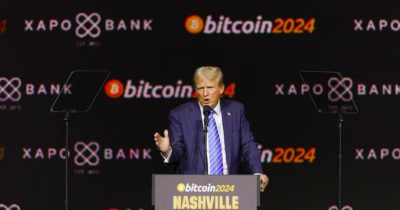Oct 31 (Reuters) – The cryptocurrency industry has spent years clashing with Democratic President Joe Biden’s administration over regulatory issues, but executives expect an easier ride from Washington, regardless of who wins the White House next week.
Crypto asset managers including Bitwise and Canary Capital are planning new products ahead of what many executives expect to be a more crypto-friendly administration, while others including Ripple are planning a fresh push for crypto legislation in the new Congress, said executives and lawyers.
“Regardless who wins, there will be a new approach to how we move forward with crypto,” said Rebecca Rettig, chief legal and policy officer at crypto company Polygon Labs.
Republican candidate Donald Trump has pledged to be a “crypto president,” and executives also expect Vice President Kamala Harris, the Democratic candidate, to take a softer stance than Biden.
Harris has not yet detailed her crypto plans, but executives have been encouraged by her promise to promote digital asset innovation and protect crypto investors.
Harris surrogate and billionaire entrepreneur Mark Cuban, a crypto enthusiast, has also criticized a crypto crackdown under Securities and Exchange Commission Chair Gary Gensler, a Biden appointee.
“Absolutely it will be friendlier under a Harris admin,” Cuban wrote in an email to Reuters, adding her promise to protect crypto users was “important.”
Gensler has insisted that the crypto industry is a risk to investors, pointing to the collapse of FTX and multiple other bankruptcies and scams that triggered calls for tighter regulation. Since bitcoin debuted in 2009, the crypto market has been extremely volatile.
Gensler’s SEC has brought dozens of enforcement actions against Coinbase, Kraken and others, accusing them of flouting U.S. securities laws meant to inform investors about potential risks.
The crypto players have denied the SEC’s allegations. They say cryptocurrencies, which have a global market value of around $2.5 trillion, should be regulated like commodities.
Gensler, whose term ends in 2026, has not said his crypto views have changed. While Trump has said he will fire Gensler, Harris has not suggested she would seek to replace him. An SEC spokesperson declined to comment.
Trump’s plan to promote bitcoin has won him several big crypto donors, including Gemini founders Cameron and Tyler Winklevoss. At least one industry boss, Ripple chairman Chris Larsen, cut Harris’ super PAC a big check and new Democratic-aligned crypto groups have raised funds for her.
Ripple, Coinbase and others have spent more than $119 million backing pro-crypto congressional candidates, according to data from Public Citizen. Among those firms’ goals is advancing legislation that would propel stablecoins, crypto tokens pegged to the U.S. dollar, into the mainstream.
“For the crypto industry, this election isn’t about choosing one party over another – this is about supporting candidates who recognize that the U.S. needs to support innovation,” Lauren Belive, Ripple’s head of U.S. policy, said in a statement.
Coinbase, which announced an additional $25 million donation to a pro-crypto PAC on Wednesday, did not respond to a request for comment.
Influential progressive lawmakers have also pressured Gensler to be tough on crypto, but some Democrats flagged concerns to the Democratic National Committee in July that some voters were alienated by that approach, Reuters previously reported.
CRYPTO THAW?
Crypto executives believe the SEC under Harris will review or even rescind guidance requiring public companies to account for crypto assets held on behalf of others as liabilities due to their riskiness.
That “SAB 121” guidance is a top crypto industry bugbear.
Because strict capital rules require banks to hold cash against liabilities, it has kept many lenders on the crypto sidelines. Cryptocurrencies would become more popular if consumers could store them with trusted lenders, executives say.
Congress voted on a bipartisan basis in May to overturn SAB 121 but Biden vetoed the resolution.
“With recent bipartisan support… I’d expect that regardless of who becomes the next president, SAB 121 is overturned,” said David Mercer, CEO of LMAX Group, which operates a crypto exchange. “That should be an accelerant for the whole crypto market.”
In August, State Street (STT.N, opens new tab announced plans to offer crypto custody, expecting the SEC to eventually revise that guidance, Reuters reported. Some executives already see a thaw.
Last month, the SEC’s chief accountant said SAB 121 did not apply to some companies, provided they met certain conditions.
Shortly after, the agency granted a “no objection” allowing BNY (BK.N, opens new tab to custody cryptocurrencies held by exchange-traded products without having to account for them as liabilities. Speaking to Bloomberg, Gensler said other banks could replicate the model.
“There’s clearly a recognition by both presidential candidates that digital assets can play a positive economic role,” said Sui Chung, CEO of Kraken subsidiary CF Benchmarks, who pointed to the BNY approval as a sign the political climate was shifting.
After losing a court challenge, the SEC this year approved bitcoin and ether ETFs. Bitwise and Canary Capital this month filed SEC applications to launch similar products that would track Ripple’s XRP crypto token.
“We do think that, whoever wins on Tuesday, crypto markets will be looking at a more favorable regulatory environment in a new administration in the new year,” a spokesperson for Bitwise said.
Given the SEC has until mid-2025 to decide on those applications, they are likely a bet on a friendlier SEC, executives said. “These filings are effectively a down payment on that change in political environment,” said Chung.
“Canary continues to see encouraging signs of a more progressive regulatory environment,” a spokesperson said in a statement, adding that was spurring investor demand for access to cryptocurrencies beyond bitcoin and ether.
Read the full article here









